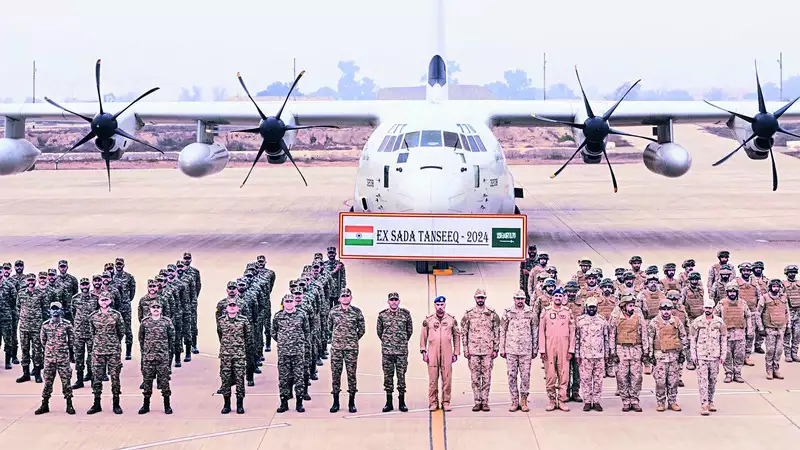India’s relationship, of late, with countries of the Middle East comes across as a quiet departure from the norm. In the last decade and more, India was forging ties with the Gulf nations for its energy needs. Though it still is for the sake of the country’s growing economy, the focus seems to have shifted to strengthening its defense front.
Recently, an India-Saudi Arabia Joint Military Exercise called Sada Tanseeq was inaugurated at Mahajan, Rajasthan. Their first-ever bilateral army drill, scheduled to be conducted from January 29 to February 10, is aimed to train troops of both nations for joint operations in semi-desert terrain. The Saudi Arabian contingent and the Indian Army contingent comprising 45 personnel each would share their best tactics and techniques of conducting operations.
This was a sequel to the joint military exercise called ‘Desert Cyclone 2024’ between India and the UAE, earlier this year, in Rajasthan. This time, the exercise was meant to enhance interoperability by learning and sharing best practices in urban operations. It’s interesting to note that the first-ever India-UAE Joint Air Forces exercise took place in 2008, at the Al-Dhafra base in Abu Dhabi.
India has also been a regular participant at the biennial International Defence Exhibition (IDEX) hosted by Abu Dhabi. The exhibition, which is the largest arms and defence technology sales exhibition in the Middle East, had over 1,300 exhibitors last year. During the event, India’s Hindustan (HAL) and the UAE’s defense firm, EDGE, signed a Memorandum of Understanding (MoU) to explore the possibility of joint design and development of missile systems and unmanned aerial vehicles (UAVs). India and the UAE also hold an Annual Defense Dialogue to discuss the security and defence cooperation issues between the two countries.
What has helped spur India’s relations with the UAE in the defense sector is the fact that the heads of both the countries are committed to taking the partnership forward.
India’s move to conduct joint military exercises, and ink agreements on counterterrorism and cybersecurity cooperation is primarily to further its engagements in the defense sector with the Gulf nations. While the UAE and Saudi Arabia top the list in this security cooperation, it is Oman that is seen as New Delhi’s ‘closest defense partner in the region’. At a joint military committee meeting in Muscat this January, India and Oman signed a Memorandum of Understanding (MoU) pertaining to procurement of defence material and equipment.
A constant engagement by India with Israel is also evident, considering the strong diplomatic relations between the two countries for 30 years, and with approximately 42.1% of all Israeli arms exports being received by India.
That said, even with Saudi Arabia, the bilateral ties have developed significantly due to better political rapport. Both the UAE and Saudi Arabia have also joined BRICS (Brazil, Russia, India, China and South Africa) grouping as of January 1 this year, thus bringing the nations together even in multilateral forums.
There is a growing sense among observers of international relations that India is also fast emerging as one of the key players in the Middle East. With players like China and Russia seemingly getting more active in the region, the UAE’s relations with the US is significant as well. The UAE hosts the only United States border preclearance in the Middle East. And it is also the only Arab country to commit military troops for humanitarian aid missions in the US-led war in Afghanistan.
For India, moving its ties from a purely economic equation to one that includes security and defense cooperation makes perfect sense as it aims for a bigger role in the region. For the nations of the Gulf also, developing security ties with India means much more than signing pacts. In all, it looks like a win-win situation for India and the Gulf nations. – The writer is Executive Editor of Nrifocus.com


Leave a Reply